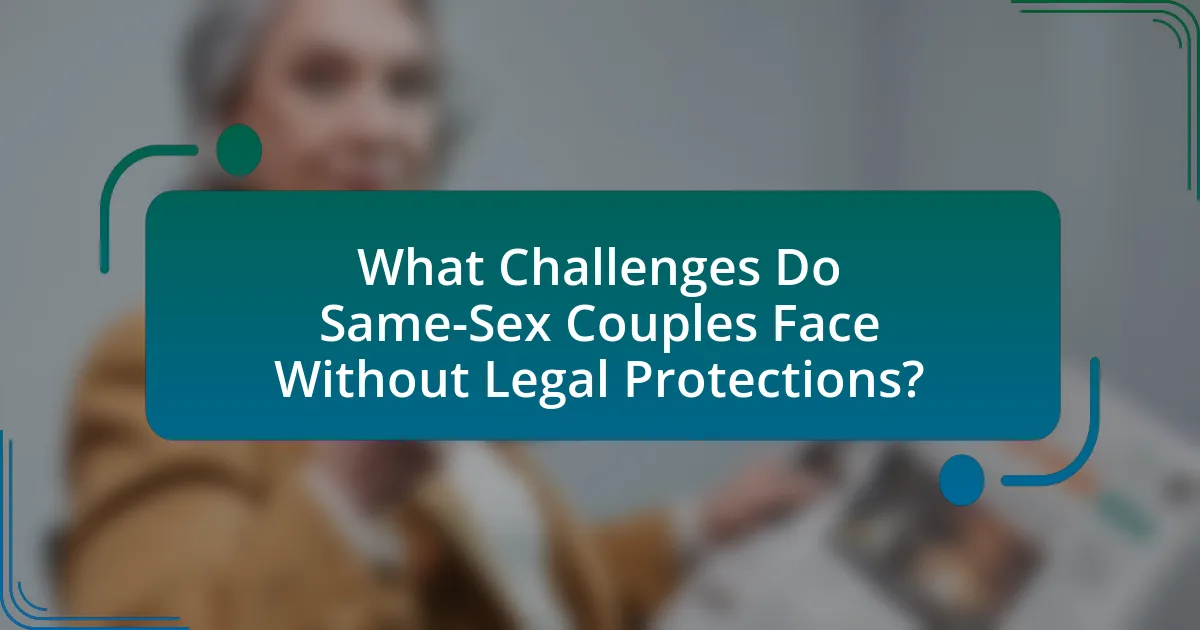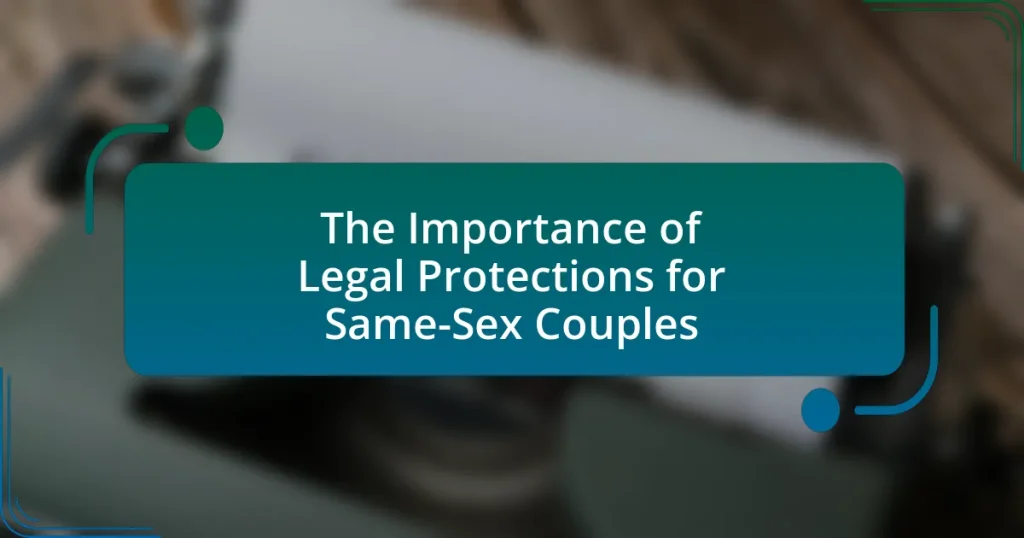The article focuses on the importance of legal protections for same-sex couples, highlighting key aspects such as marriage equality, adoption rights, and anti-discrimination laws. It discusses the historical context that necessitated these protections, the evolution of societal attitudes towards same-sex relationships, and landmark legal cases that have shaped current frameworks. The article also examines the specific rights afforded to same-sex couples, the challenges they face without legal recognition, and the benefits that legal protections provide, including emotional, psychological, and financial stability. Additionally, it outlines steps for strengthening these protections and best practices for same-sex couples to navigate legal systems effectively.

What are Legal Protections for Same-Sex Couples?
Legal protections for same-sex couples include marriage equality, adoption rights, and anti-discrimination laws. In the United States, the landmark Supreme Court case Obergefell v. Hodges (2015) established that same-sex couples have the constitutional right to marry, thereby granting them the same legal benefits and responsibilities as heterosexual couples. Additionally, many states have enacted laws that allow same-sex couples to adopt children, ensuring equal parental rights. Anti-discrimination laws at both federal and state levels protect same-sex couples from discrimination in employment, housing, and public accommodations, further solidifying their legal standing and rights within society.
Why are Legal Protections Important for Same-Sex Couples?
Legal protections are important for same-sex couples because they ensure equal rights and access to benefits that heterosexual couples receive. These protections include marriage rights, inheritance rights, and access to healthcare decisions, which are crucial for legal recognition and social acceptance. For instance, the U.S. Supreme Court’s decision in Obergefell v. Hodges (2015) legalized same-sex marriage nationwide, affirming that denying marriage rights to same-sex couples violates the Constitution’s guarantees of equal protection and due process. This landmark ruling illustrates how legal protections not only provide tangible benefits but also promote societal equality and reduce discrimination against same-sex couples.
What specific rights do these legal protections provide?
Legal protections for same-sex couples provide specific rights such as the ability to marry, adopt children, access spousal benefits, and make medical decisions for one another. These rights are established through various laws and court rulings, including the landmark Supreme Court decision in Obergefell v. Hodges (2015), which legalized same-sex marriage nationwide, affirming that denying marriage rights to same-sex couples violates the Equal Protection Clause of the Fourteenth Amendment. Additionally, legal protections ensure that same-sex couples can enjoy the same tax benefits, inheritance rights, and protections against discrimination in employment and housing as heterosexual couples.
How do legal protections impact the lives of same-sex couples?
Legal protections significantly enhance the lives of same-sex couples by providing them with equal rights and benefits comparable to those enjoyed by heterosexual couples. These protections include marriage rights, adoption rights, and access to healthcare benefits, which contribute to greater social acceptance and stability within their relationships. For instance, a study by the Williams Institute found that legal recognition of same-sex marriage leads to improved mental health outcomes for LGBTQ+ individuals, demonstrating the positive impact of legal protections on their well-being. Additionally, legal protections help reduce discrimination in various areas, such as employment and housing, further promoting equality and security for same-sex couples.
What historical context led to the need for Legal Protections?
The historical context that led to the need for legal protections for same-sex couples includes widespread discrimination, criminalization of same-sex relationships, and the lack of legal recognition for these unions. In many countries, same-sex relationships were historically viewed as immoral or illegal, with laws that criminalized homosexual acts, such as the sodomy laws in the United States and the UK. This legal marginalization created significant social and economic disadvantages for same-sex couples, who were denied rights related to marriage, inheritance, and healthcare. The Stonewall Riots in 1969 marked a pivotal moment in the LGBTQ+ rights movement, highlighting the urgent need for legal protections and equality. As a result, advocacy efforts intensified, leading to the eventual recognition of same-sex marriage in various jurisdictions, underscoring the necessity for legal frameworks that protect the rights of same-sex couples.
How have societal attitudes towards same-sex couples evolved?
Societal attitudes towards same-sex couples have evolved significantly over the past few decades, shifting from widespread stigma and discrimination to greater acceptance and support. In the 1970s, same-sex relationships were often criminalized and viewed negatively, but by the 2000s, many countries began to recognize same-sex marriage, reflecting a broader societal change. For instance, a 2020 Gallup poll indicated that 67% of Americans supported same-sex marriage, a stark contrast to just 27% in 1996. This evolution is further evidenced by legal advancements, such as the U.S. Supreme Court’s 2015 ruling in Obergefell v. Hodges, which legalized same-sex marriage nationwide, highlighting a significant shift in both legal recognition and public opinion.
What landmark legal cases have influenced these protections?
Landmark legal cases that have influenced protections for same-sex couples include Obergefell v. Hodges (2015), which legalized same-sex marriage nationwide, and United States v. Windsor (2013), which struck down key provisions of the Defense of Marriage Act, thereby recognizing federal benefits for same-sex couples. These cases established a legal foundation for equality and non-discrimination, significantly advancing the rights of same-sex couples in the United States.
What are the current legal frameworks supporting Same-Sex Couples?
The current legal frameworks supporting same-sex couples include marriage equality laws, civil union statutes, and anti-discrimination protections. In many countries, such as the United States, the Supreme Court’s decision in Obergefell v. Hodges (2015) legalized same-sex marriage nationwide, affirming that same-sex couples have the same legal rights as heterosexual couples. Additionally, various states have enacted laws that provide civil unions or domestic partnerships, granting similar rights and responsibilities. Anti-discrimination laws at both federal and state levels further protect same-sex couples from discrimination in areas such as employment, housing, and public accommodations, reinforcing their legal standing and rights within society.
Which countries have implemented comprehensive legal protections?
Countries that have implemented comprehensive legal protections for same-sex couples include Canada, the Netherlands, Spain, Sweden, and Germany. These nations have established laws that recognize same-sex marriage, provide anti-discrimination protections, and ensure equal rights in areas such as adoption and inheritance. For instance, Canada legalized same-sex marriage in 2005, becoming one of the first countries to do so, while the Netherlands was the first in the world to legalize it in 2001. Such legal frameworks demonstrate a commitment to equality and protection of rights for same-sex couples.
How do these laws vary across different jurisdictions?
Laws regarding legal protections for same-sex couples vary significantly across different jurisdictions. In some countries, such as Canada and the Netherlands, same-sex marriage is fully recognized and couples enjoy comprehensive legal rights, including adoption and spousal benefits. Conversely, in jurisdictions like Russia and several states in the United States, same-sex marriage may be banned or not recognized, leading to limited legal protections and rights for same-sex couples. This disparity is often influenced by cultural, religious, and political factors, resulting in a patchwork of legal recognition and protections globally. For instance, as of 2023, 29 countries have legalized same-sex marriage, while many others still impose restrictions or lack recognition altogether, highlighting the varied landscape of legal protections for same-sex couples.

What Challenges Do Same-Sex Couples Face Without Legal Protections?
Same-sex couples face significant challenges without legal protections, including lack of access to healthcare benefits, inheritance rights, and legal recognition of their relationships. These couples often encounter difficulties in making medical decisions for their partners, as hospitals may not recognize them as next of kin. Additionally, without legal marriage or civil union status, same-sex couples may face obstacles in property ownership and financial planning, leading to potential disputes over assets. Research from the Williams Institute indicates that legal recognition improves mental health outcomes for LGBTQ+ individuals, highlighting the importance of legal protections in fostering stability and security in same-sex relationships.
What are the potential risks for same-sex couples lacking legal recognition?
Same-sex couples lacking legal recognition face significant risks, including limited access to healthcare, inheritance rights, and legal protections against discrimination. Without legal status, partners may be denied critical medical decisions during emergencies, as hospitals often prioritize biological relatives. Additionally, in the absence of legal recognition, same-sex couples may struggle with inheritance issues, as assets may not automatically transfer to a partner upon death, leading to potential financial instability. Furthermore, they are vulnerable to discrimination in employment and housing, as many jurisdictions lack laws that protect against such biases for unmarried couples. These risks highlight the essential need for legal recognition to ensure equitable treatment and protection for same-sex couples.
How does the absence of legal protections affect family rights?
The absence of legal protections significantly undermines family rights, particularly for same-sex couples. Without legal recognition, same-sex families face challenges in areas such as inheritance, healthcare decision-making, and parental rights, which can lead to discrimination and unequal treatment. For instance, a study by the Williams Institute found that same-sex couples without legal protections are more likely to experience barriers in accessing family-related benefits and services, highlighting the critical need for legal frameworks to ensure equitable treatment and recognition of family structures.
What financial implications arise from a lack of legal recognition?
A lack of legal recognition for same-sex couples leads to significant financial implications, including the inability to access tax benefits, inheritance rights, and spousal benefits. Without legal status, same-sex couples cannot file joint tax returns, which often results in higher tax liabilities compared to heterosexual couples who can benefit from tax deductions and credits available to married couples. Additionally, in the absence of legal recognition, partners may face challenges in inheriting assets without incurring substantial estate taxes, as they are not recognized as legal heirs. Furthermore, they are often excluded from health insurance benefits and retirement plans that are typically available to legally recognized spouses, leading to increased out-of-pocket expenses for healthcare and reduced financial security in retirement. These financial disadvantages underscore the critical need for legal protections to ensure equitable treatment and financial stability for same-sex couples.
How do discrimination and stigma impact same-sex couples?
Discrimination and stigma significantly impact same-sex couples by creating barriers to equal treatment and access to resources. These couples often face social exclusion, which can lead to mental health issues such as anxiety and depression, as evidenced by studies indicating higher rates of these conditions among LGBTQ+ individuals compared to their heterosexual counterparts. Furthermore, discrimination can manifest in legal contexts, where same-sex couples may encounter challenges in areas like healthcare, housing, and employment, undermining their stability and well-being. Research from the Williams Institute shows that legal protections, such as marriage equality, can mitigate these negative effects by fostering social acceptance and reducing discrimination, ultimately improving the quality of life for same-sex couples.
What role does societal acceptance play in the need for legal protections?
Societal acceptance significantly influences the need for legal protections, as it shapes public attitudes and policies regarding marginalized groups, including same-sex couples. When societal acceptance is low, individuals may face discrimination and lack of support, necessitating legal frameworks to safeguard their rights and ensure equality. For instance, research by the Williams Institute indicates that states with higher levels of acceptance of same-sex relationships are more likely to enact comprehensive legal protections for these couples. This correlation underscores that legal protections often arise as a response to societal attitudes, aiming to mitigate the adverse effects of discrimination and promote equal treatment under the law.
How can legal protections help combat discrimination?
Legal protections can help combat discrimination by establishing clear rights and remedies for individuals facing unfair treatment based on their identity. These protections, such as anti-discrimination laws, ensure that same-sex couples have equal access to housing, employment, and public services, thereby reducing instances of bias and prejudice. For example, the U.S. Supreme Court’s decision in Obergefell v. Hodges (2015) legalized same-sex marriage, reinforcing the legal standing of same-sex couples and providing them with protections against discrimination in marriage-related matters. This legal framework not only empowers individuals to seek justice but also promotes societal acceptance by signaling that discrimination is unacceptable.

What are the Benefits of Legal Protections for Same-Sex Couples?
Legal protections for same-sex couples provide essential rights and benefits, including access to marriage, adoption, healthcare decisions, and inheritance. These legal recognitions ensure that same-sex couples can enjoy the same legal status and protections as heterosexual couples, which is crucial for their social and economic stability. For instance, a study by the Williams Institute found that legalizing same-sex marriage significantly improves mental health outcomes for LGBTQ+ individuals, demonstrating the positive impact of legal recognition on well-being. Additionally, legal protections help prevent discrimination in various areas, such as employment and housing, thereby fostering equality and social acceptance.
How do legal protections enhance the stability of same-sex relationships?
Legal protections enhance the stability of same-sex relationships by providing legal recognition and rights that promote equality and security. These protections, such as marriage equality and anti-discrimination laws, ensure that same-sex couples have access to the same benefits and responsibilities as heterosexual couples, which fosters a sense of legitimacy and commitment in their relationships. Research indicates that legal recognition of same-sex relationships correlates with lower rates of relationship dissolution, as couples feel more secure in their partnership when protected by law. For instance, a study published in the Journal of Marriage and Family found that states with marriage equality laws experienced a significant decrease in the rates of relationship breakdown among same-sex couples, highlighting the stabilizing effect of legal protections.
What emotional and psychological benefits arise from legal recognition?
Legal recognition provides significant emotional and psychological benefits, including enhanced feelings of security and belonging. When same-sex couples receive legal recognition, they experience validation of their relationships, which can lead to increased self-esteem and reduced feelings of isolation. Research indicates that legal recognition correlates with lower rates of mental health issues, such as anxiety and depression, among LGBTQ+ individuals. For instance, a study published in the American Journal of Public Health found that states with marriage equality laws reported improved mental health outcomes for same-sex couples compared to those without such laws. This demonstrates that legal recognition not only affirms relationships but also contributes positively to the overall well-being of individuals within those relationships.
How do legal protections contribute to financial security for couples?
Legal protections significantly enhance financial security for couples by ensuring equitable rights and access to shared resources. These protections, such as marriage or civil union laws, provide legal recognition that facilitates joint ownership of property, inheritance rights, and access to spousal benefits like health insurance. For instance, a study by the Williams Institute found that legal recognition of same-sex relationships leads to increased economic stability, as couples can pool resources and benefit from tax advantages. Additionally, legal protections safeguard against discrimination in employment and housing, further contributing to financial well-being.
What role do legal protections play in parenting for same-sex couples?
Legal protections are crucial for parenting among same-sex couples as they ensure equal rights and responsibilities in child-rearing. These protections, such as adoption rights, parental recognition, and access to healthcare, provide legal recognition that is essential for the stability and security of the family unit. For instance, a study by the Williams Institute found that legal recognition of same-sex relationships significantly increases the likelihood of same-sex couples becoming parents, thereby highlighting the importance of legal frameworks in facilitating family formation. Additionally, legal protections help prevent discrimination and ensure that same-sex parents can make medical and educational decisions for their children, which is vital for the child’s well-being and development.
How do these protections affect adoption and custody rights?
Legal protections for same-sex couples significantly enhance adoption and custody rights by ensuring equal treatment under the law. These protections eliminate discriminatory practices that previously hindered same-sex couples from adopting children or securing custody rights. For instance, the U.S. Supreme Court’s decision in Obergefell v. Hodges (2015) established that same-sex marriage is a constitutional right, which subsequently influenced adoption laws, allowing same-sex couples to adopt jointly in all states. Furthermore, legal recognition of same-sex relationships facilitates access to parental rights, enabling both partners to be recognized as legal parents, thereby providing stability and security for children.
What legal considerations are important for same-sex parents?
Same-sex parents must consider legal aspects such as adoption rights, parental recognition, and custody arrangements. Adoption laws vary by state, with some jurisdictions allowing same-sex couples to adopt jointly while others may impose restrictions. Parental recognition is crucial, as it ensures both parents are legally acknowledged, which can affect inheritance and decision-making rights. Custody arrangements can be complex, especially in cases of separation, where legal documentation is essential to protect parental rights. Legal protections, including marriage equality rulings, have strengthened these considerations, as seen in the 2015 Supreme Court decision in Obergefell v. Hodges, which affirmed the right to marry for same-sex couples, thereby impacting parental rights and protections.
What can be done to strengthen Legal Protections for Same-Sex Couples?
To strengthen legal protections for same-sex couples, lawmakers can enact comprehensive non-discrimination laws that explicitly include sexual orientation and gender identity. Such laws would ensure equal treatment in areas like employment, housing, and public accommodations, thereby reducing discrimination. For instance, the Equality Act, which has been proposed in the U.S. Congress, aims to amend the Civil Rights Act to include protections for LGBTQ+ individuals, demonstrating a legislative approach to enhancing legal safeguards. Additionally, states can implement policies that recognize same-sex marriages and partnerships in all legal contexts, ensuring that same-sex couples have access to the same rights and benefits as heterosexual couples. This includes tax benefits, inheritance rights, and healthcare decision-making privileges, which are crucial for the well-being of families.
How can advocacy and activism influence legal changes?
Advocacy and activism can significantly influence legal changes by mobilizing public opinion and pressuring lawmakers to enact reforms. For instance, the marriage equality movement in the United States, driven by organizations like the Human Rights Campaign, successfully shifted societal attitudes towards same-sex marriage, culminating in the Supreme Court’s decision in Obergefell v. Hodges in 2015, which legalized same-sex marriage nationwide. This demonstrates how sustained advocacy efforts can lead to tangible legal outcomes by creating a supportive environment for legislative change.
What steps can individuals take to support legal protections?
Individuals can support legal protections for same-sex couples by advocating for inclusive legislation, participating in awareness campaigns, and engaging in community organizing. Advocacy efforts can include contacting legislators to express support for bills that protect same-sex marriage and related rights, as seen in the successful passage of the Respect for Marriage Act in 2022, which aimed to safeguard marriage equality. Participation in awareness campaigns, such as Pride events or educational workshops, helps to foster understanding and acceptance within communities. Additionally, community organizing can mobilize local support, as demonstrated by grassroots movements that have effectively influenced public policy and legal reforms in favor of LGBTQ+ rights.
What are the best practices for Same-Sex Couples to navigate legal protections?
Same-sex couples should prioritize obtaining legal documentation such as marriage licenses, wills, and powers of attorney to ensure comprehensive legal protections. These documents provide essential rights regarding inheritance, medical decisions, and property ownership. For instance, a study by the Williams Institute found that legal recognition of same-sex relationships significantly improves access to health care and financial benefits. Additionally, couples should consult with legal professionals who specialize in LGBTQ+ rights to navigate state-specific laws and protections effectively. This approach ensures that same-sex couples are informed about their rights and can advocate for themselves in legal matters.


